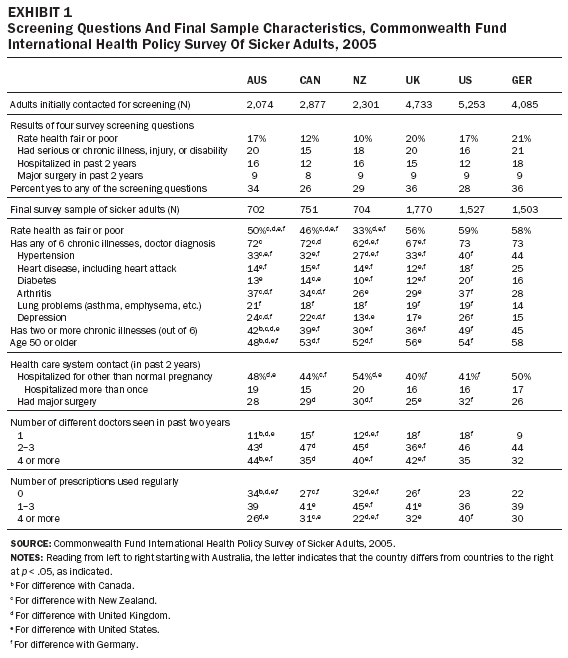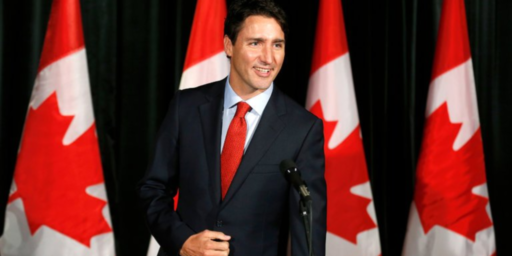Americans Sicker Despite Paying More for Health Care?
A study by the Commonwealth Fund of health care in the United States, the United Kingdom, Australia, Canada, Germany and New Zealand is getting a lot of attention in the press. A sampling of headlines from Google News:
-
US lags behind other nations in healthcare, study says (Boston Globe)
U.S. Lags Behind Other Nations in Health Care (Forbes)
U.S. health care found lacking, full of errors — Treatment in States costlier, more inept than in other nations (SF Chronicle)
Care costs more in U.S. than other Western nations (FW Star-Telegram)
Americans pay more, get less for health care (Lexington Herald-Leader)
Higher costs, worse health care for Americans (Salt Lake Tribune)
Heres’s the WaPo story by Rob Stein that most of the above are based on:
For Americans, Getting Sick Has Its Price (A2)
Americans pay more when they get sick than people in other Western nations and get more confused, error-prone treatment, according to the largest survey to compare U.S. health care with other nations. The survey of nearly 7,000 sick adults in the United States, Australia, Canada, New Zealand, Britain and Germany found Americans were the most likely to pay at least $1,000 in out-of-pocket expenses. More than half went without needed care because of cost and more than one-third endured mistakes and disorganized care when they did get treated.
Although patients in every nation sometimes run into obstacles to getting care and deficiencies when they do get treated, the United States stood out for having the highest error rates, most disorganized care and highest costs, the survey found. “What’s striking is that we are clearly a world leader in how much we spend on health care,” said Cathy Schoen, senior vice president for the Commonwealth Fund, a private, nonpartisan, nonprofit foundation that commissioned the survey. “We should be expecting to be the best. Clearly, we should be doing better.”
Other experts agreed, saying the results offer the most recent evidence that the quality of care in the United States is seriously eroding even as health care costs skyrocket. “This provides confirming evidence for what more and more health policy thinkers have been saying, which is, ‘The American health care system is quietly imploding, and it’s about time we did something about it,’ ” said Lucian L. Leape of the Harvard School of Public Health.
The new survey, the eighth in an annual series of cross-national surveys conducted by Harris Interactive for the fund, is the largest to examine health care quality across several nations during the same period. The survey was aimed at evaluating care across varying types of health care systems, including the market-driven U.S. system and those that have more government controls and subsidies.
The survey, published in the journal Health Affairs, questioned 6,957 adults who had recently been hospitalized, had surgery or reported health problems between March and June of this year.
Sign me up for socialized medicine, stat! We’re in an absolute crisis here in the USA–I’m surprised anyone is still alive.
But wait. Here’s the story that brought the rest to my attention:
Canada, U.S. patients report similar medical error rates: study (CBC News)
Canadian patients surveyed reported almost the same levels of medical errors as patients in the United States, says a new survey. The Commonwealth Fund surveyed people with health problems in six countries: the U.S., Canada, the United Kingdom, Australia, Germany and New Zealand.
According to the survey, 34 per cent of Americans reported medication or medical mistakes or lab errors. By comparison, 30 per cent of Canadians with health problems reported they experienced errors. Patients in the United Kingdom were the least likely to report errors (22 per cent).
Canadians and Americans were less likely to get same-day or next-day access to their doctors (23 per cent and 30 per cent), compared to people in the other four countries. New Zealand reported the speediest appointments, with 58 per cent of people reporting same-day access to doctors, while Germany followed at 56 per cent.
The Commonwealth Fund, which says its mission is to support independent research on health care, conducted the survey between March and June 2005. Surveyors questioned 700-750 adults in Australia, Canada, and New Zealand and 1,500 or more in the UK, United States, and Germany. The respondents rated their health as fair or poor and had recently been hospitalized or had an injury or disability.
This is not a study of the quality of health care in six of the world’s richest countries. Instead, it is a study of the health care of those who “rated their health as fair or poor and had recently been hospitalized or had an injury or disability.”
This is confirmed by looking at the study, Taking the Pulse of Health Care Systems: Experiences of Patients with Health Problems in Six Countries, itself.
Sample and study design. The survey screened initial random samples of adults age eighteen or older to identify those who met at least one of four criteria: rated their health as fair or poor; reported that they had a serious illness, injury, or disability that required intensive medical care in the past two years; or reported that in the past two years they had major surgery or had been hospitalized for something other than a normal pregnancy.
Further, if one looks at the actual breakdowns of the sample, we see that the U.S. cohort was both older and sicker than average:

You’ll note, too, that the U.S. sample had much higher incidence of diabetes and hypertension than that from other countries. Presumably, this is because they are fatter.
Also, 40% of the U.S. cohort were taking four or more prescription medications, far more than any of the other cohorts. Whether this is a function of being sicker to begin with or an artifact of the American preference to be treated with drugs is not something that can be determined from the chart.
The bottom line is that we’re not comparing apples and apples here. It may well be that Americans pay more for health care and get less for it. But this study certainly doesn’t prove it.






Must be Bush’s fault.
I have found that one gets the health care that he/she wants, providing you take a degree of responsibility yourself. I find that doctors are usually at the mercy of their office staff for scheduling etc. The doctor most often don’t know whats really going on in his office, but will listen to any complaints that you bring to his/her attention. Doctors have so many patients that it is a rare occasion when you are called by your first name. In other words, you are “just another patient” to them. I place most of the problems squarely at the feet of the beancounters that usually think you, the patient, as another an accounts receivable asset.
The only real way to get good care is to make yourself heard, even if it takes some ranting.
One will get the care that he/she demands, but again, you have to make yourself rather outspoken.
It’s also a very good idea to constantly double check what your doctor tells you and prescribes for you. Thats where my computer comes in, I check everything.
If you are in the hospital, do not take any word from the hospital staff for granted. Question every procedure and medication they give you.
I firmly think that you get what you pay for and health care is no exception.
I agree that you found some problems with their method, but wouldn’t you say this is still scary:
I am a free market type guy, and will go with the free market every time … until I hit a problem it does not solve.
If “more than half” of the people who meet the selection criteria went without care that concerns me. We could, and should, drill that down to see how many of those are the ones with serious problems, and not merely those who “rated their health as fair or poor” in order to know exactly what kind of problem we have.
I personally put health care above market purity, something I would not do for the average product in our market economy.
It all depends on what you consider to be “health care”: either taking care of oneself, or going to the doctor for every little sniffle.
With no statistics whatsoever to back it up, I would venture to say there is likely some correlation between those who do not have health care, and how well they take care of themselves.
The truth is, 50% of americans pay for health care, 50% get it for free (it’s paid for by those enrolled in HC programs).
We know that’s not complete. There really are some who don’t get it.
I understand of course that there probably is a program somewhere they could take advantage of … but we are talking about the many slips between cup and lip.
Heck, there are also people with insurance who skip treatments because they don’t want to establish “pre-existing conditions.”
One story (typical or atypical I’ll leave you to guess) come from the recent issue of Bicycling magazine. It is broadly about “invisible riders,” the people who for a variety of reasons commute by cheap bike to work each day:
“I heard a story about a rider in the relatively calm, upscale suburb of Glendale who was hit by a car as he rode to work – after traversing the more dangerous streets early in his commute. The accident happened in front of a hospitial, but because the rider had no insurance, he was taken by ambulance to the county emergency room 10 miles away. The diagnosis was a broken pelvis, but there were complications, and the patient slipped into a coma. He died six weeks later.”
… see to me that is just wrong. If we are taking people who are hurt litterally in front of a hopital and driving them 10 miles to an “emergency” room … we just don’t value human life as highly as our health care “framework.”
That’s the best you can come up with odo?
I mean, a story in a bicycling magazine, about healthcare, where some undicsclosed person “heard” about this story, where a guy got hit, and later died…
Any indication that there would not have been complications, and that he would have lived? Or would he just have died after receiveing care in a different hospital?
Could the biker, perhaps have requested transport to county, knowing that he did not have insurance?
Can’t you do any better than this?
‘One story (typical or atypical I’ll leave you to guess) ‘
Let me guess? I’ll guess apocryphal.
At what point can we stop taking responsibility for the failure of others to avail themselves of the opportunities we provide them?
It a story out of the world LJD, complaining that it is not typical doesn’t make it false. It doesn’t say it doesn’t happen.
We know it does, sometimes. That is our system.
The real question should be, if we want the policy to be that someone hurt in front of a hospital gets to go inside, how do we do it?
Well if they are “unable” to figure things out, and take care of themselves, that kind of puts them in the “needs help” category.
I know a lot of government aid is (absurdly) for people who already take care of themsleves, but that is not the normal purpose of assistence.
How do you help those that won’t help themselves?
My earlier point being, if some one IS critically injured, it is highly unlikely they will be turned away. They will receive care, and you and I have to pay for it.
How do you insure those who have the opportunity, but have chosen NOT to pay?
You have this idea that you and I will manage to pay for everybody, when the survey said:
I get the idea that you are willing to help care for people who need it, but that you are unsure we need to do more … that survey tells me we need to do more.
Unless you can prove, with some actual data, that everybody is getting the care they need.
Unless you can prove, with some actual data, that everybody is getting the care they need (with socialized medicine).
I’m not the one selling absolutes here (“all people” or “no people”). I’m concerned that some people miss treatment, and that is supported by the article above. Indeed the article claims that other systems do better:
Now, when you say everybody gets health care in the US, where does that come from?
I think James is correct that factors in the survey could shift the numbers a bit … but I don’t think he is saying there is not room for improvement. He and I might just disagree about how to achieve that improvement.
To use a software analogy, how many times to you patch a system before a rewrite?
I can see your concern: Kool-Aid is not provided as part of a health care program.
“I’m not the one selling absolutes here (“all people†or “no peopleâ€Â).” Who then?
“Now, when you say everybody gets health care in the US, where does that come from?” WHO is YOU?
I said that if you show up bleeding at the doorstep of the ER, it is “highly unlikely they will be turned away”.
Criticize that and you criticize the care-givers, not the system. Maybe you can rebut with an article from a surfing magazine this time?
Come on man, my views are supported by the stories at the top of this thread. I’ve pointed to, and quoted them, a number of times.
You said:
Fifty plus fifty equals one hundred, or “everybody.”
Your fisking of this study is mostly rubbish. By the time you extrapolate out the different diseases (as I’m sure that the authors and their peer reviewers did), it doesn’t make any difference to the overall category which is people who are sick. Cultural treatment patterns are mostly responsible for the different use of drugs. One drug more or less is a bogus measure; if you put the French and Japanese in this survey, they’d be using far more per head. In fact the Germans, whom the article compares most closely with the US experience in its conclusion, are sicker than the Americans on many measures (more hospitalizations, older and more hypertension)–if you want to interpret the data in your twisted way. The point is that the authors got to a comparable group of people who were in general sick and had interactions with the health care system. That’s all they were trying to do, and within the limits of the study they succeeded.
But much more importantly, the issues on which they are asked are NOT generally relevant to just sick people. Problems with coordination of care, medical errors, poor communication from physicians, etc, etc, are likely to happen to everyone….they just happen more to the sick because they have more interactions with the system.
And you managed to avoid the major finding of the survey on costs–which has now been repeated in eight years of research covering many different groups of respondents. The answer is of course that costs here are much higher and are concentrated much more among the sick.
If you really think you know what you’re talking about, write Health Affairs a letter in protest, and prepared to get your face ripped off in a very nice academic way.
But stop pretending that the whole body of work on international health findings that this study represents is wrong because you think you found a little statistical trick they missed.
Come on MATTHEW he is right and you are wrong again. This is an opinion poll from uninformed berry pickers and not hard stats. You are the best at spinning these fruitcake opinion polls Matthew. You probably trained these commonwealth people how to do it and probably supplied the questions too.
So Matthew, should the New England Journal of Medicine publish these goofy findings? Some wag in Liverpool thinks, blah, blah, blah. So that’s hard evidence that England’s death rate for breast cancer is lower than the USA’s, get real Matthew.
Matthew is a Brit here trying to Socialize American health care. Matthew thinks football is played with a round ball.
You can comment to Matthew at “The Health Care Blog.” If you can stand all the Socialist there.
Matthew thinks football is played with a round ball.
Well, not to bust your rant, but statistically, it *is*…
Actually… that Bicycling magazine article isn’t even a good example since the article was really about illegal immigration.